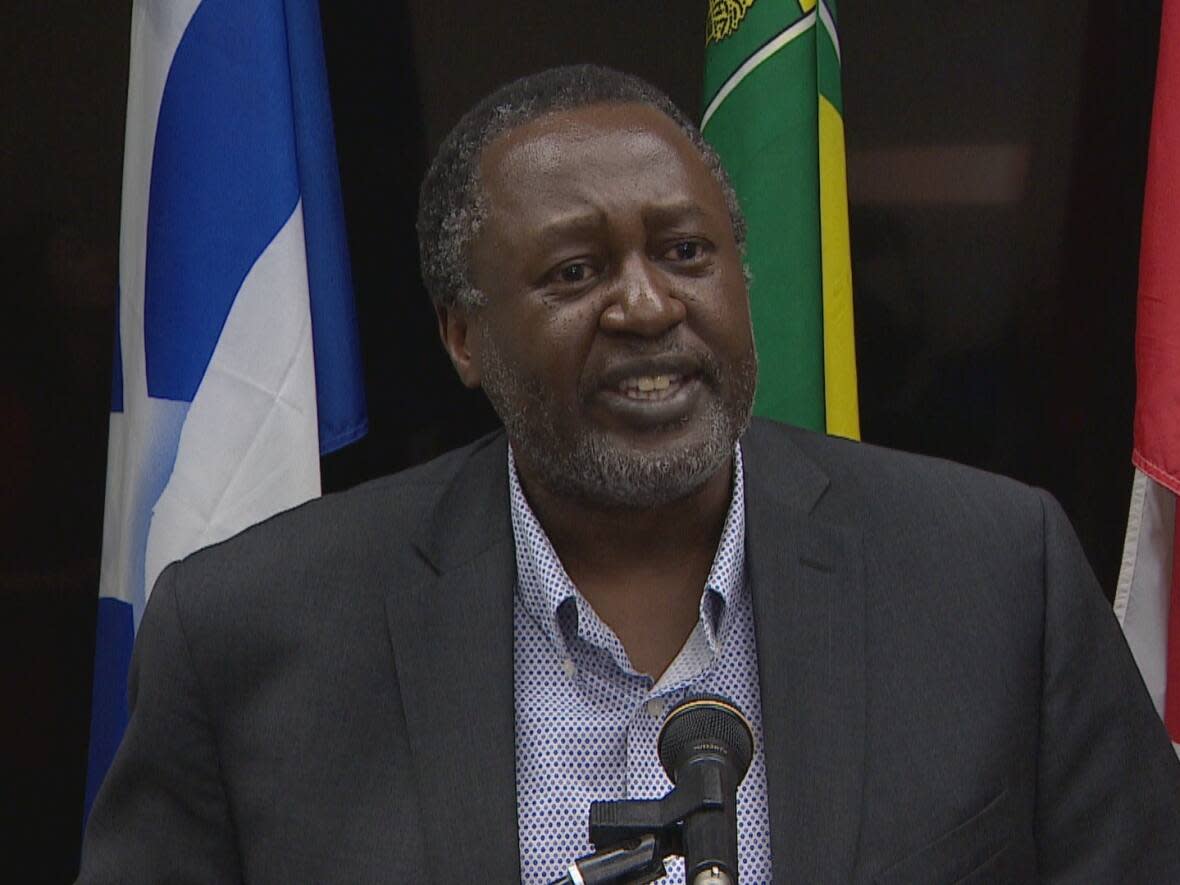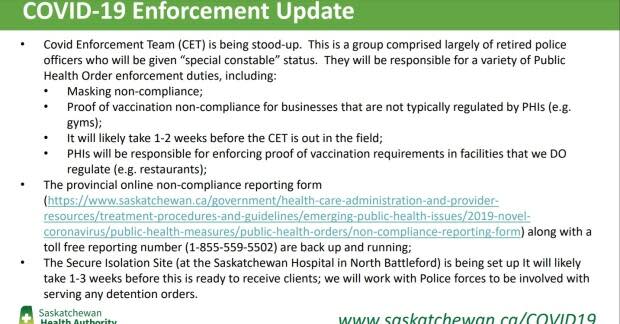Ex-police will enforce COVID-19 rules, 'secure isolation site' to relaunch, Sask. doctors told

Saskatchewan is recruiting former police officers to help enforce COVID-19 public health rules, and is also planning a "secure isolation site" in North Battleford, according to an official with the Saskatchewan Health Authority.
The SHA hosted its latest COVID-19 physician town hall on Thursday. The biweekly forum is intended to allow doctors to share information and advice among themselves, but it also contains a wealth of up-to-date information on Saskatchewan's COVID-19 epidemiology and the health-care sector's efforts to curb the disease.
The town hall — a recording of which is typically posted online on Fridays — is also an opportunity for doctors to present their own advice to the Saskatchewan public, including a plea issued during Thursday's town hall for people to limit their contacts to one household during the Thanksgiving weekend.
"We are really concerned that Thanksgiving … is really going to be another very bad accelerant to an already bad situation," said Dr. Johnmark Opondo, a medical health officer with the Saskatchewan Health Authority, adding that the province is already deep into its fourth wave.
During his presentation, Opondo also shared news about the province's offensive strategy against COVID-19.
An enforcement team is being set up by the Ministry of Health to help public health inspectors regulate "masking non-compliance complaints" and "vaccination non-compliance complaints from businesses or the public," Opondo said.
The team is "a group of retired police officers who are really going to assist us, particularly where we are short in terms of public health inspectors," he said.

Under recently enacted public health orders in response to the fourth wave, Saskatchewan residents must wear a mask in all public places. They must also show proof of COVID-19 vaccination or a negative test if they wish to access some non-essential businesses or venues.
The province also recently brought back the requirement for infected people to isolate for 10 days. Close contacts who are unvaccinated must isolate for 14 days.
Online form to file complaints
Opondo also noted the province has a website where people can fill out a form to inform officials about people allegedly not following the public health orders.
In addition to the enforcement team, the health authority is also preparing to revive a "secure isolation site" at Saskatchewan Hospital in North Battleford, Opondo said.
In an emailed statement on Tuesday, the Saskatchewan Public Health Agency — which it was announced last week will jointly lead the province's COVID-19 response through the Provincial Emergency Operations Centre — said the secure isolation site had been discontinued on July 11 when all public health measures were dropped.
The site is specifically for individuals who wilfully fail to comply with isolation orders to prevent the spread of COVID-19 while contagious, says Christopher Clemett, the agency's acting executive director of enterprise projects and external relations
The site is being re-established "to ensure that individuals who are required to self-isolate, but who fail to or are unable to, follow the direction of a medical health officer," Clemett said.
The location of the site was previously undisclosed, though CBC News has reported that people had been detained there for not following isolation orders in Saskatoon.
Opondo said it will take one to three weeks to get the site set up again and fully staffed.
"When they are ready to receive clients, we will work in the same way as we did during the third wave," Opondo said. "Public health inspectors and the police, once the medical health officer has signed the form for secure isolation, will be involved in assisting in transporting and moving people into the secure isolation site."
A slide presented during his remarks said, "We will work with police forces to be involved with serving any detention orders."
The secure isolation site's return will come in addition to existing assisted self-isolation sites, which are available for people who do not have a safe and effective place to isolate and who either tested positive for COVID-19, are awaiting test results or are identified as a contact by a public health official, Clemett says.
Assisted self-isolation sites continue to operate in Prince Albert, Regina and Saskatoon.
"Efforts are made to house individuals in their home community or as close to it as possible," Clemett said. "Emergency Crisis Support staff and health care workers provide supervision and support to individuals."


